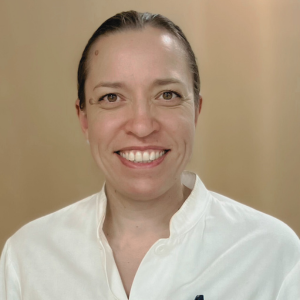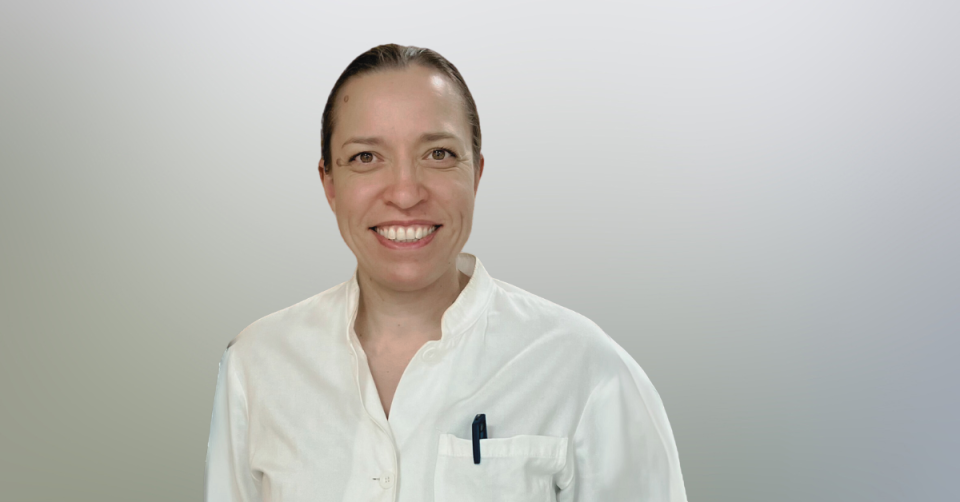15 December 2023
Assistant Professor Aida Hansen is among the three talented skin researchers who are the first to receive a LEO Foundation Dr Abildgaard Fellowship of DKK 12 million.
The LEO Foundation Dr Abildgaard Fellowships are a new LEO Foundation grant instrument – each fellowship worth DKK 12 million for a five-year period – established in 2023 to support skin research talents who have the ambition to establish or expand an independent research group at a not-for-profit Danish research institution, and who are also starting their careers as research leaders.
Assistant Professor Aida Hansen receives the fellowship for her skin research proposal, focusing on the role of extracellular vesicles in inflammatory skin conditions such as psoriasis. Aida Hansen’s focus is inspired by her previous research which found that activated T cells secrete extracellular vesicles containing multiple pro-inflammatory molecules. With this five-year research grant, Aida Hansen will be able to establish a research group at the Department of Molecular Medicine at the University of Southern Denmark (SDU).
Aida Hansen receives a LEO Foundation Dr Abildgaard Fellowship through the 2023 research theme, Skin Immunology and Inflammatory Skin Diseases.
Aida Hansen
Assistant Professor, University of Southern Denmark, Department of Molecular Medicine, Denmark, DKK 12m

Project title – T-cell derived extracellular vesicles constitute pro-inflammatory packages that drive disease progression in psoriasis
Fellowship theme: Skin Immunology and Inflammatory Skin Diseases
Aida Hansen’s vision is to improve the treatment options for psoriasis patients by contributing to a more detailed understanding of the cellular cross-talk mediating the inflammatory processes in the disease. She aims to investigate a novel concept for cellular cross-talk, mediated by vesicular structures known as extracellular vesicles (EVs), that may drive inflammation in psoriasis.
Aida Hansen’s project builds upon knowledge that psoriasis is mainly driven by pro-inflammatory cytokines, and recently, it was discovered that cytokines are partly packaged into EVs. She hypothesizes that the majority of cytokines implicated in psoriasis are carried in specific subsets of EVs constituting “pro-inflammatory packages”. She will: 1) Do an in-depth investigation of the packaging of cytokines into EVs derived from patients with severe psoriasis, 2) Investigate the functional impact of specific EV-subpopulations in driving the inflammatory response in psoriasis, and 3) Explore the therapeutic concept for neutralizing specific disease-promoting EVs in psoriasis.
Aida Hansen hopes to contribute to a deeper understanding of how cytokines are being transported between cells and the potentially different biological properties of soluble cytokines compared to cytokines packaged into EVs. This is still poorly understood. The outcome of her project may lead to identification of new inflammatory pathways and novel depletion strategies for innovative therapeutic interventions to alleviate symptoms and improve the quality of life for patients with severe psoriasis.
From AU to SDU – engaging in a new research environment
Aida Hansen has been exploring cellular communication and immune system regulation since her PhD project and her Postdoc training at Aarhus University, Denmark, and Stanford University, USA. In 2021, she returned to Aarhus University as an Assistant Professor.
Presently affiliated with Aarhus University, Aida Hansen will relocate to SDU’s Department of Molecular Medicine in spring 2024 to establish a research group that dives into the investigation of cellular cross-talk that mediates the inflammatory processes in psoriasis. SDU has a track record for its translational research within inflammation, therefore a promising match for her continued development of her research field.
Aida Hansen explains how the LEO Foundation Dr Abildgaard Fellowship is earmarked for the establishment of her research group at SDU.
“This fellowship grant from the LEO Foundation will enable me to establish a research group at SDU to study cell signaling by extracellular vesicles in inflammation and psoriasis. The grant will have a major impact on my continuous development as a researcher and now research leader,” says Aida Hansen.
Unlocking the secrets of extracellular vesicles
During the LEO Foundation Dr Abildgaard Fellowships’ review process and interviews, Aida Hansen highly impressed reviewers with her determined and independent mindset, as her mastery of a complex field quickly convinced reviewers of her potential to become one of its pioneers.
Aida Hansen’s work focuses on the multifaceted roles of extracellular vesicles, which, despite originating from the same cell, perform diverse functions. She highlights the challenge of understanding and identifying the heterogeneity of these vesicles.
“Extracellular vesicles have several unique features that enable them to regulate other cells through various mechanisms, both locally and globally in the body,” she explains and continues:
“All cells produce a wide range of different extracellular vesicles, each with distinct functions, even though they originate from the same cell. A main challenge in the field is the limited knowledge about, and the lack of effective methods to determine, this heterogeneity. With our research, we hope to identify unique markers of specifically disease-promoting extracellular vesicles. These could be targets for novel therapeutic strategies to mitigate inflammation in psoriasis without affecting the extracellular vesicles that are important for maintaining homeostasis,” Aida Hansen explains.
Aida Hansen hopes to generate insights for both psoriasis and other diseases with her research, as her ambitions for the future remain high.
“With this grant, I can pursue more long-term and ambitious research objectives. My ambition is to establish a research group that in the future will be leading in the field of cellular communication by extracellular vesicles in inflammatory diseases and cancer.”
Becoming a group leader and a positive role model
On a more personal level, Aida Hansen aims not just to broaden our understanding of the skin and its diseases, but also to become a positive role model for other aspiring scientists.
“This grant makes it possible for me to become a group leader, which I am really excited about. I am especially looking forward to contributing to the development of new research talents within my group. As a leader, it is important to me to create a supportive environment and to foster a culture of collaboration and teamwork. In my role, I will aspire to be a positive example for fellow young female scientists, balancing family life with a career in academia.”
In 2023, three talented skin scientists received a LEO Foundation Dr Abildgaard Fellowship. Discover more about the grantees and details of these fellowships here.
About LEO Foundation Dr Abildgaard Fellowships
The LEO Foundation Dr Abildgaard Fellowships program aims to support talented, emerging research leaders, both Danish and international, with ambitions to establish or expand an independent research group at a not-for-profit Danish research institution, and to pursue novel and important research questions within skin and skin diseases.
The LEO Foundation Dr Abildgaard Fellowship program is thematic and is announced once a year in open competition. Grants of DKK 12 million are awarded for a five-year period.
In 2024 the application deadline is 17 April (16:00 CEST). Applicants can apply within one of the two themes, Advanced Therapeutics Research in Skin Diseases and Systems Medicine in Dermatology. Read more about the program and eligibility criteria here.
About the LEO Foundation
The LEO Foundation is one of the largest private funders globally of independent skin research. The Foundation provides philanthropic grants with the aim to support the best international research in skin diseases and make Denmark a global beacon for skin research. Over the past decade, the LEO Foundation has given more than DKK 1 billion in grants and awards to independent skin – in Denmark and all over the world.
